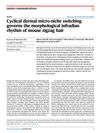 24 citations,
June 2018 in “Reviews in endocrine and metabolic disorders”
24 citations,
June 2018 in “Reviews in endocrine and metabolic disorders” Thyroid diseases may contribute to autoimmune skin diseases, and more research is needed on their relationship.
 17 citations,
January 2019 in “International journal of biological sciences”
17 citations,
January 2019 in “International journal of biological sciences” Researchers used CRISPR/Cas9 to create a goat with a gene that increased cashmere production by 74.5% without affecting quality.
 November 2023 in “The journal of investigative dermatology/Journal of investigative dermatology”
November 2023 in “The journal of investigative dermatology/Journal of investigative dermatology” The article concludes that creating a detailed map of normal human skin at the single-cell level is important.
 6 citations,
November 2018 in “Histochemistry and Cell Biology”
6 citations,
November 2018 in “Histochemistry and Cell Biology” Mongolian gerbils heal wounds differently than mice, with unique protein levels and gene expression that affect skin repair.
 5 citations,
January 2021 in “iScience”
5 citations,
January 2021 in “iScience” Using a combination of specific cell cycle regulators is better for safely keeping hair root cells alive indefinitely compared to cancer-related methods.
 7 citations,
November 2020 in “Experimental Dermatology”
7 citations,
November 2020 in “Experimental Dermatology” Different cell types work together to repair skin, and targeting them may improve healing and reduce scarring.
 14 citations,
January 2015 in “Genetics and molecular research”
14 citations,
January 2015 in “Genetics and molecular research” The transition from growth to regression in Cashmere goat hair follicles involves changes in expression of genes related to keratin and cell differentiation.
 36 citations,
October 1996 in “Dermatologic Clinics”
36 citations,
October 1996 in “Dermatologic Clinics” Mice are useful for researching human hair loss and testing treatments, despite some differences between species.
2 citations,
January 2022 in “The Application of Clinical Genetics” A young Russian girl with Meier-Gorlin syndrome has two new mutations in the CDC6 gene.
13 citations,
September 2022 in “Frontiers in immunology” Ifidancitinib, a JAK inhibitor, effectively regrows hair in mice with alopecia by tiring out harmful T cells.
 21 citations,
June 2016 in “Genesis”
21 citations,
June 2016 in “Genesis” Researchers identified specific genes that are important for mouse skin cell development and healing.
 1 citations,
March 2024 in “Signal transduction and targeted therapy”
1 citations,
March 2024 in “Signal transduction and targeted therapy” NF-κB signaling is crucial in many diseases and can be targeted for new treatments.

Changes in skin bacteria can affect hair loss and new treatments targeting these bacteria may prevent balding without sexual side effects.
8 citations,
July 2020 in “BMC genomics” The research found genes that change during cashmere goat hair growth and could help determine the best time to harvest cashmere.
 24 citations,
October 2014 in “Cold Spring Harbor Perspectives in Medicine”
24 citations,
October 2014 in “Cold Spring Harbor Perspectives in Medicine” Genetic research has advanced our understanding of skin diseases, but complex conditions require an integrative approach for deeper insight.
 October 2024 in “Stem Cell Research & Therapy”
October 2024 in “Stem Cell Research & Therapy” CGF therapy may effectively treat psoriasis by reducing inflammation.
 January 2024 in “Archives of Endocrinology and Metabolism”
January 2024 in “Archives of Endocrinology and Metabolism” A new gene mutation causes insulin resistance in a girl and her mother.
 31 citations,
January 2021 in “Experimental Dermatology”
31 citations,
January 2021 in “Experimental Dermatology” Skin organoids are a promising new model for studying human skin development and testing treatments.
 March 2023 in “bioRxiv (Cold Spring Harbor Laboratory)”
March 2023 in “bioRxiv (Cold Spring Harbor Laboratory)” Scientists can now create skin with hair by reprogramming cells in wounds.
 48 citations,
May 2019 in “Genome Biology”
48 citations,
May 2019 in “Genome Biology” Researchers found that certain RNA circles in the brain are linked to disease risk, but their exact role in disease is still unknown.
 December 2016 in “Springer eBooks”
December 2016 in “Springer eBooks” Chrousos Syndrome is caused by mutations that make the body less sensitive to glucocorticoids, leading to various symptoms and requiring high-dose treatment.
 February 2024 in “Biomedical materials”
February 2024 in “Biomedical materials” Scientists created a lab-grown hair follicle model that behaves like real hair and could improve hair loss treatment research.
Current hair regeneration methods show promise but face challenges in maintaining cell effectiveness and creating the right environment for hair growth.
 1 citations,
November 2020 in “Biochemical Society transactions”
1 citations,
November 2020 in “Biochemical Society transactions” Different types of skin stem cells can change and adapt, which is important for developing new treatments.
 16 citations,
February 2018 in “BMC Genomics”
16 citations,
February 2018 in “BMC Genomics” Certain genetic markers linked to reproductive potential were identified by their impact on a protein's ability to bind to genes.
 4 citations,
August 2023 in “Nature Communications”
4 citations,
August 2023 in “Nature Communications” Mouse zigzag hair bends form due to a 3-day cycle of changes in hair progenitors and their environment.
365 citations,
November 2018 in “Journal of Allergy and Clinical Immunology” People with atopic dermatitis have different skin bacteria, and targeting these bacteria might help treat the condition.
 13 citations,
July 2017 in “Biopolymers”
13 citations,
July 2017 in “Biopolymers” Recombinant keratins can form useful structures for medical applications, overcoming natural keratin limitations.
February 2024 in “Cancers” New treatments targeting androgen receptors show promise for drug-resistant prostate cancer.
 2 citations,
September 2020 in “Biomedical materials”
2 citations,
September 2020 in “Biomedical materials” Recombinant keratin materials may better promote skin cell differentiation than natural keratin.
























